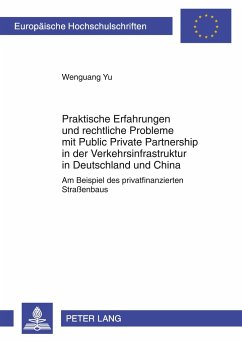
Risk Sharing in Public-Private Partnership Contracts
Organised by Paulo Sérgio Mendes César and Camila da Cunha Souza do Amaral
Versandkostenfrei!
Versandfertig in 6-10 Tagen
27,99 €
inkl. MwSt.

PAYBACK Punkte
14 °P sammeln!
The Public-Private Partnership (PPP) has been consolidated in Brazil as an alternative to solve the need for public investment in a scenario of state budget limitations. In addition to the scarcity of public resources as a justification for the use of PPPs, it is also claimed that private initiative is more efficient. The legislation then adapted to the modern concepts proposed by the Partnerships. Minas Gerais stood out in the country, being the first state to create a law regulating this type of concession, by Law 14.868 of 2003, even before federal legislation, which was only created in 200...
The Public-Private Partnership (PPP) has been consolidated in Brazil as an alternative to solve the need for public investment in a scenario of state budget limitations. In addition to the scarcity of public resources as a justification for the use of PPPs, it is also claimed that private initiative is more efficient. The legislation then adapted to the modern concepts proposed by the Partnerships. Minas Gerais stood out in the country, being the first state to create a law regulating this type of concession, by Law 14.868 of 2003, even before federal legislation, which was only created in 2004 by Law 11.079. The legal innovation of PPPs is the objective sharing of risks between the partners involved, and this study will analyse the sharing of risks in the concession contract for the MG-050 motorway, an initiative of the Minas Gerais state government.














